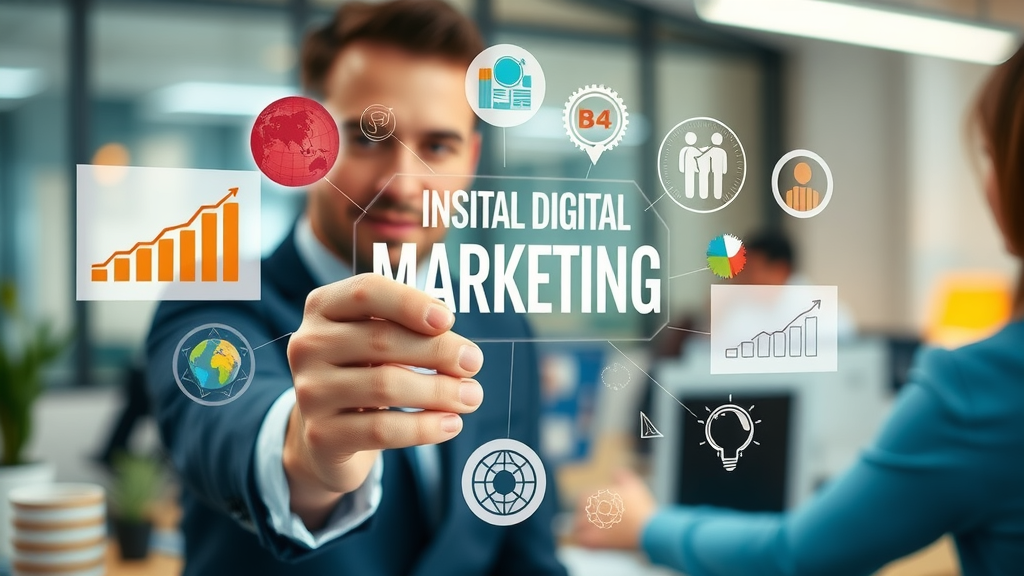Delve into the world of digital marketing where seismic growth opportunity awaits. As we unveil practical pathways and expert insights, you’ll discover exactly how to harness the vast power of digital marketing to launch your success story.
Revealing the Untapped Potential of Digital Marketing
“Digital marketing spending is projected to grow from $520 billion in 2021 to $780 billion in 2026.”
In today’s swiftly evolving business ecosystem, digital marketing serves as a dynamic powerhouse. This staggering growth projection showcases its critical role in global business strategies. For small businesses as well as large corporations, digital marketing unlocks unlimited potential to reach a worldwide audience effortlessly.
With a primary focus on social media platforms and content marketing, digital marketing allows brands to not only enhance their online presence but also engage audiences with precision. The most advantageous aspect is its scalability, empowering businesses of all sizes to customize their marketing investments based on specific goals and marketing strategies.
Understanding the Digital Marketing Landscape
An Overview of Digital Marketing
Digital marketing embodies all promotional efforts using electronic devices or the internet. Businesses leverage channels such as search engines, social media, email, and other websites to connect with prospective customers. This marketing landscape is fueled by technological advancements and shifts in consumer behavior that favor digital interactions.

As a digital marketer, it's essential to comprehend how different digital marketing skills can be applied to create a cohesive strategy. This includes understanding various media platforms, effectively utilizing email marketing, and optimizing search engine visibility.
Key Components of Digital Marketing
A multifaceted discipline, digital marketing encompasses various components critical for designing an effective strategy:
- Search Engine Optimization (SEO): Enhancing website visibility through improving search rankings.
- Content Marketing: Creating valuable, relevant content to attract and retain a clearly defined audience.
- Social Media Marketing: Leveraging platforms like Facebook, Instagram, and LinkedIn to reach a wider audience.
- Email Marketing: Building relationships with prospects and customers via personalized email content.
- Pay-Per-Click (PPC): Buying visits to your site via sponsored ads on search engines.
How to Start Digital Marketing as a Beginner
Building Fundamental Marketing Skills
Embarking on a career in digital marketing begins with honing essential marketing skills. This includes mastering the art of crafting compelling narratives, understanding consumer psychology, and analyzing market trends. For beginners, there are abundant resources and marketing certification programs available to build foundational skills.

Don’t forget the importance of developing analytical skills to make data-driven decisions. Being able to interpret statistical results and KPIs is vital for successfully deploying and monitoring digital campaigns.
Essential Tools and Resources
Equipping yourself with the right tools is crucial. Utilize beginner-friendly platforms like Google Analytics for web analytics, Canva for design, and Hootsuite for social media management. To further enhance your proficiency, explore tools for SEO such as SEMrush and Moz, which aid in understanding and improving search engine rankings.
Leverage online learning platforms like Coursera, Udemy, and HubSpot Academy which provide courses catered to beginners and advance learners alike.
Navigating Social Media for Digital Marketers
Choosing the Right Platforms
Not all social media platforms suit every business model. It is paramount to analyze which platforms your target audience frequents. Facebook and Instagram often favor consumer brands, while LinkedIn is a solid choice for B2B interactions. TikTok and Snapchat appeal significantly to younger demographics, making them ideal for specific sectors.
Developing a Social Media Marketing Strategy
Creating a winning social media marketing strategy demands an understanding of your audience, setting clear objectives, and delivering consistent content. Use analytics to measure engagement and sales conversion rates to continuously refine your strategy for optimal results.

Content Marketing: Capturing Audience Attention
Crafting Engaging Content
Content creation lies at the heart of compelling marketing campaigns. It is crucial to capture your audience's attention with engaging and valuable information. Use varied formats such as blogs, videos, infographics, and podcasts to maintain interest and engagement.
Leveraging Platforms for Distribution
Distribute content strategically through platforms like YouTube, Pinterest, and LinkedIn to reach a wider audience. Strong distribution amplifies content reach and relevance, thus expanding your online presence significantly.

Demystifying Search Engine Optimization (SEO)
Understanding Search Engine Algorithms
Search engine algorithms determine the relevancy of web pages shown in search results. Understanding these algorithms is vital for optimizing your pages effectively. Regular updates to these algorithms mean continuous learning and adaptation is required for maintaining SEO effectiveness.
Implementing Effective SEO Strategies
Start by conducting keyword research and optimizing on-page elements such as meta tags, image alt attributes, and content structure. Building high-quality backlinks also plays a critical role in improving search visibility.
Comprehending Marketing Certifications
Importance of Digital Marketing Certification
Certifications validate your skills and knowledge, setting you apart from competitors in job markets. They offer industry recognition and can be a testament to your commitment to learning and excellence in the field of digital marketing.
Popular Certification Programs
Look for programs such as Google Analytics Certification, HubSpot Inbound Marketing Certification, and Facebook Blueprint. These certifications cater to varied interests and expertise levels, covering essential aspects of digital marketing.

Creating Impactful Digital Marketing Campaigns
Setting Campaign Goals
Your campaign’s success hinges on setting clear, attainable goals. These could range from increasing brand awareness, generating leads, or boosting sales. Goals provide a roadmap to define strategy and metrics to measure performance.
Tracking and Measuring Success
Employ tools like Google Analytics, HubSpot, and SEMrush to track traffic, user behavior, and conversion rates. Regular analysis helps identify what's working and what needs adjustment, ensuring you're maximizing return on investment.
Adjusting Strategies for Better Results
Flexibility is key in digital marketing. Based on your data analysis, swiftly adjust your strategies to align with audience preferences and market demands. Regular iterations are crucial to maintaining campaign relevance and effectiveness.
Embarking on a Career in Digital Marketing
Opportunities in the Marketing Landscape
The digital marketing industry offers vast opportunities for careers across various functions like SEO specialists, content marketers, social media managers, and PPC analysts. As businesses continue to shift to digital, demand for skilled professionals increases, showcasing promising career prospects.
Required Skills and Expertise
Successful digital marketers exhibit proficient communication skills, creativity, analytical ability, and a keen understanding of digital tools and platforms. Continuous learning and adaptability remain vital in this ever-evolving field.
FAQs on How to Start Digital Marketing
How to start digital marketing as a beginner?
Begin by learning the fundamentals through courses and tutorials. Focus on understanding SEO, content creation, and social media strategies. Practice these skills by developing small projects and engaging in marketing-related activities.
Can I start digital marketing on my own?
Yes, you can initiate your digital marketing journey independently by utilizing online resources and tools. Many platforms offer free courses, and you can start building practical projects to gain experience.
What are the 7 types of digital marketing?
The seven primary types are: SEO, Content Marketing, Social Media Marketing, Pay-Per-Click Advertising, Email Marketing, Affiliate Marketing, and Influencer Marketing.
Can I start digital marketing for free?
Absolutely. Leverage free tools like Google Analytics, SEO tools like UberSuggest, and social media platforms to learn and execute basic digital marketing tasks without initial investment.
Summary: Key Takeaways for Aspiring Digital Marketers
- Begin with understanding the digital marketing landscape.
- Hone marketing skills and utilize essential tools.
- Leverage the power of social media and content marketing.
- Gain proficiency in SEO and consider certifications.
- Develop and manage successful marketing campaigns.
- Pursue a rewarding career by acquiring the necessary expertise.
Embark on Your Digital Marketing Journey Now
Diving into digital marketing requires determination, continuous learning, and strategic application of acquired skills. Begin today by exploring resources, building your skills, and experimenting with small-scale campaigns to pave your way towards success.
Comparison of Digital Marketing Tools and Platforms
| Tool/Platform | Purpose | Features |
|---|---|---|
| Google Analytics | Web Analytics | Traffic analysis, User behavior tracking |
| Hootsuite | Social Media Management | Post scheduling, Analytics tracking |
| Canva | Design Tool | Template design, Image editing |
| SEMrush | SEO Tool | Keyword research, Competitor analysis |
 Add Row
Add Row  Add
Add 




Write A Comment